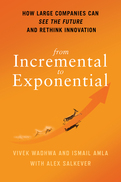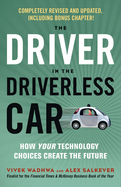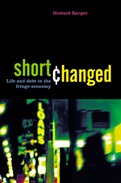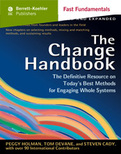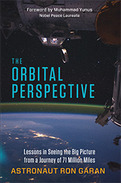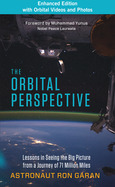Search Results: "Seeing Red Cars"
Results 7-12 of 247
“This timely book reminds us that innovation is agnostic about where it's created.”
—Satya Nadella, CEO, Microsoft
Over and over, we see big legacy businesses getting beaten to the punch by energetic little start-ups. It seems like innovation can come from only the bottom up or from the outside in. But tech experts Vivek Wadwha and Ismail Amla are here to tell you that “big equals slow and stodgy” is a myth. Based on decades of experience working with both the world's leading brands and disruptive start-ups, this book explores the opportunity legacy companies have to create new markets, supercharge growth, and remake their businesses by combining the mindset and tool belt of start-ups with the benefits of incumbency: boatloads of customer data, decades of brand equity, robust distribution channels, enormous financial assets, and more.
Wadhwa and Amla go deeply into why the pace and dynamics of innovation have changed so dramatically in recent years and show how companies can overcome obstacles like the Eight Deadly Sins of Stasis. Equally important, they provide a playbook on how to use their insights in your own company, team, or career. This fast-paced, anecdote-rich story rethinks modern innovation—a book every manager, executive, and ambitious employee will want to read.
—Satya Nadella, CEO, Microsoft
Over and over, we see big legacy businesses getting beaten to the punch by energetic little start-ups. It seems like innovation can come from only the bottom up or from the outside in. But tech experts Vivek Wadwha and Ismail Amla are here to tell you that “big equals slow and stodgy” is a myth. Based on decades of experience working with both the world's leading brands and disruptive start-ups, this book explores the opportunity legacy companies have to create new markets, supercharge growth, and remake their businesses by combining the mindset and tool belt of start-ups with the benefits of incumbency: boatloads of customer data, decades of brand equity, robust distribution channels, enormous financial assets, and more.
Wadhwa and Amla go deeply into why the pace and dynamics of innovation have changed so dramatically in recent years and show how companies can overcome obstacles like the Eight Deadly Sins of Stasis. Equally important, they provide a playbook on how to use their insights in your own company, team, or career. This fast-paced, anecdote-rich story rethinks modern innovation—a book every manager, executive, and ambitious employee will want to read.
Tech experts Vivek Wadhwa and Alex Salkever describe dozens of astonishing technological advances in this fascinating and thought-provoking book, which asks what kind of future lies ahead—Star Trek or Mad Max?
Breakthroughs such as personalized genomics, drones, self-driving vehicles, and artificial intelligence could make our lives healthier, safer, and easier. On the other hand, the same technologies raise the specter of a frightening future—eugenics, a jobless economy, a complete loss of privacy, and ever-worsening economic inequality.
Wadhwa says that we need to ask three questions about every emerging technology: Does it have the potential to benefit everyone equally? What are the risks and the rewards? And does it promote autonomy or dependence? This edition is updated throughout and includes a new chapter on quantum computing, which promises vastly increased processing times—and vastly increased security risks. In the end, our future is up to us; our hands may not be on the wheel, but we will decide the driverless car's destination.
Breakthroughs such as personalized genomics, drones, self-driving vehicles, and artificial intelligence could make our lives healthier, safer, and easier. On the other hand, the same technologies raise the specter of a frightening future—eugenics, a jobless economy, a complete loss of privacy, and ever-worsening economic inequality.
Wadhwa says that we need to ask three questions about every emerging technology: Does it have the potential to benefit everyone equally? What are the risks and the rewards? And does it promote autonomy or dependence? This edition is updated throughout and includes a new chapter on quantum computing, which promises vastly increased processing times—and vastly increased security risks. In the end, our future is up to us; our hands may not be on the wheel, but we will decide the driverless car's destination.
Shortchanged
2005
Drive through just about any low-income neighborhood and you're sure to see streets lined with pawnshops, check cashers, rent-to-own stores, payday and tax refund lenders, auto title pawns, and buy-here-pay-here used car lots. We're awash in "alternative financial services" directed at the poor and those with credit problems. Howard Karger describes this world as an economic Wild West, where just about any financial scheme that's not patently illegal is tolerated.
Taking a hard look at this fringe economy, Karger shows that what seem to be small, independent storefront operations are actually part of a fully-formed parallel economy dominated by a handful of well-financed corporations, subject to little or no oversight, with increasingly strong ties to mainstream financial institutions. "It is a hidden world," Karger writes, "where a customer's economic fate is sealed with a handshake, a smile, and a stack of fine print documents that would befuddle many attorneys."
Filled with heartbreaking stories of real people trapped in perpetual debt, Shortchanged exposes the deceptive practices that allow these businesses to prey on people when they are most vulnerable. Karger reveals the many ways this industry has run amok, ruining countless people's lives, and shows that it's not just the poor but, more and more, maxed-out middle class consumers who fall prey to these devious schemes.
Balancing compassion with a realistic awareness of the risks any business faces in working with an economically distressed clientele, Karger details hard headed, practical recommendations for reforming this predatory industry.Drive through just about any low-income neighborhood and you're sure to see streets lined with pawnshops, check cashers, rent-to-own stores, payday and tax refund lenders, auto title pawns, and buy-here-pay-here used car lots. We're awash in "alternative financial services" directed at the poor and those with credit problems. Howard Karger describes this world as an economic Wild West, where just about any financial scheme that's not patently illegal is tolerated.
Taking a hard look at this fringe economy, Karger shows that what seem to be small, independent storefront operations are actually part of a fully-formed parallel economy dominated by a handful of well-financed corporations, subject to little or no oversight, with increasingly strong ties to mainstream financial institutions. "It is a hidden world," Karger writes, "where a customer's economic fate is sealed with a handshake, a smile, and a stack of fine print documents that would befuddle many attorneys."
Filled with heartbreaking stories of real people trapped in perpetual debt, Shortchanged exposes the deceptive practices that allow these businesses to prey on people when they are most vulnerable. Karger reveals the many ways this industry has run amok, ruining countless people's lives, and shows that it's not just the poor but, more and more, maxed-out middle class consumers who fall prey to these devious schemes.
Balancing compassion with a realistic awareness of the risks any business faces in working with an economically distressed clientele, Karger details hard headed, practical recommendations for reforming this predatory industry.
-
Chronicles how fringe economy businesses ruthlessly and systematically exploit the poor and the middle classes
-
Feature dozens of personal stories from individuals whose lives have been ruined by participating in this fringe economy
-
Includes hard-headed, practical recommendations for reforming fringe economy business practices
For astronaut Ron Garan, living on the International Space Station was a powerful, transformative experience—one that he believes holds the key to solving our problems here on Earth.
On space walks and through windows, Garan was struck by the stunning beauty of the Earth from space but sobered by knowing how much needed to be done to help this troubled planet. And yet on the International Space Station, Garan, a former fighter pilot, was working work side by side with Russians, who only a few years before were “the enemy.” If fifteen nationalities could collaborate on one of the most ambitious, technologically complicated undertakings in history, surely we can apply that kind of cooperation and innovation toward creating a better world. That spirit is what Garan calls the “orbital perspective.”
Garan vividly conveys what it was like learning to work with a diverse group of people in an environment only a handful of human beings have ever known. But more importantly, he describes how he and others are working to apply the orbital perspective here at home, embracing new partnerships and processes to promote peace and combat hunger, thirst, poverty, and environmental destruction. This book is a call to action for each of us to care for the most important space station of all: planet Earth. You don't need to be an astronaut to have the orbital perspective. Garan's message of elevated empathy is an inspiration to all who seek a better world.
On space walks and through windows, Garan was struck by the stunning beauty of the Earth from space but sobered by knowing how much needed to be done to help this troubled planet. And yet on the International Space Station, Garan, a former fighter pilot, was working work side by side with Russians, who only a few years before were “the enemy.” If fifteen nationalities could collaborate on one of the most ambitious, technologically complicated undertakings in history, surely we can apply that kind of cooperation and innovation toward creating a better world. That spirit is what Garan calls the “orbital perspective.”
Garan vividly conveys what it was like learning to work with a diverse group of people in an environment only a handful of human beings have ever known. But more importantly, he describes how he and others are working to apply the orbital perspective here at home, embracing new partnerships and processes to promote peace and combat hunger, thirst, poverty, and environmental destruction. This book is a call to action for each of us to care for the most important space station of all: planet Earth. You don't need to be an astronaut to have the orbital perspective. Garan's message of elevated empathy is an inspiration to all who seek a better world.
This enhanced edition includes over an hour of video: extraordinary footage of astronaut Ron Garan's life on the International Space Station, and vignettes of inspiring projects on Earth that show the orbital perspective in action.
For astronaut Ron Garan, living on the International Space Station was a powerful, transformative experience—one that he believes holds the key to solving our problems here on Earth.
On space walks and through windows, Garan was struck by the stunning beauty of the Earth from space but sobered by knowing how much needed to be done to help this troubled planet. And yet on the International Space Station, Garan, a former fighter pilot, was working work side by side with Russians, who only a few years before were “the enemy.” If fifteen nationalities could collaborate on one of the most ambitious, technologically complicated undertakings in history, surely we can apply that kind of cooperation and innovation toward creating a better world. That spirit is what Garan calls the “orbital perspective.”
Garan vividly conveys what it was like learning to work with a diverse group of people in an environment only a handful of human beings have ever known. But more importantly, he describes how he and others are working to apply the orbital perspective here at home, embracing new partnerships and processes to promote peace and combat hunger, thirst, poverty, and environmental destruction. This book is a call to action for each of us to care for the most important space station of all: planet Earth. You don't need to be an astronaut to have the orbital perspective. Garan's message of elevated empathy is an inspiration to all who seek a better world.
For astronaut Ron Garan, living on the International Space Station was a powerful, transformative experience—one that he believes holds the key to solving our problems here on Earth.
On space walks and through windows, Garan was struck by the stunning beauty of the Earth from space but sobered by knowing how much needed to be done to help this troubled planet. And yet on the International Space Station, Garan, a former fighter pilot, was working work side by side with Russians, who only a few years before were “the enemy.” If fifteen nationalities could collaborate on one of the most ambitious, technologically complicated undertakings in history, surely we can apply that kind of cooperation and innovation toward creating a better world. That spirit is what Garan calls the “orbital perspective.”
Garan vividly conveys what it was like learning to work with a diverse group of people in an environment only a handful of human beings have ever known. But more importantly, he describes how he and others are working to apply the orbital perspective here at home, embracing new partnerships and processes to promote peace and combat hunger, thirst, poverty, and environmental destruction. This book is a call to action for each of us to care for the most important space station of all: planet Earth. You don't need to be an astronaut to have the orbital perspective. Garan's message of elevated empathy is an inspiration to all who seek a better world.


